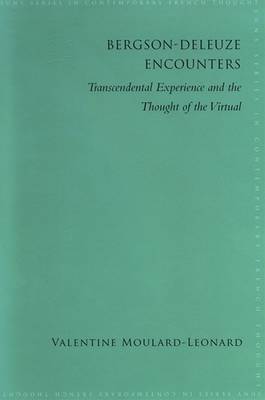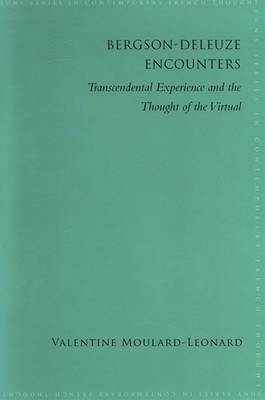
- Retrait gratuit dans votre magasin Club
- 7.000.000 titres dans notre catalogue
- Payer en toute sécurité
- Toujours un magasin près de chez vous
- Retrait gratuit dans votre magasin Club
- 7.000.0000 titres dans notre catalogue
- Payer en toute sécurité
- Toujours un magasin près de chez vous
Bergson-Deleuze Encounters
Transcendental Experience and the Thought of the Virtual
Valentine Moulard-LeonardDescription
Explores the continuities and discontinuities in the work of Henri Bergson and Gilles Deleuze.
Bergson-Deleuze Encounters sheds light on the intricate bond between French philosophers Henri Bergson and Gilles Deleuze. It explores the major diffraction between the two thinkers, conveys a sense of the irreducible originality of Deleuze's thought, and offers a detailed account of Bergson's "Copernican Revolution." In so doing, it presents an explanation of thought and experience that contrasts with the dominant account of the phenomenological tradition. Valentine Moulard-Leonard argues that Bergson and Deleuze share a novel conception of the transcendental-which they call the Virtual-that marks a new era in thinking, in which what is ultimately at stake is a new vision of time, experience, and materiality. The Virtual provides an indispensable alternative to the totalizing systems spawned by the traditional transcendent image of thought-be they systems of idealism, scientific positivism, nationalism, racism, sexism, or dogmatism.
Spécifications
Parties prenantes
- Auteur(s) :
- Editeur:
Contenu
- Nombre de pages :
- 208
- Langue:
- Anglais
- Collection :
Caractéristiques
- EAN:
- 9780791475324
- Date de parution :
- 01-07-09
- Format:
- Livre broché
- Format numérique:
- Trade paperback (VS)
- Dimensions :
- 150 mm x 226 mm
- Poids :
- 340 g

Les avis
Nous publions uniquement les avis qui respectent les conditions requises. Consultez nos conditions pour les avis.






